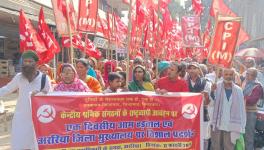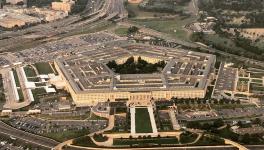Let Down by Reformists, Working-Class Iranians Join Widespread Protests
Dariush Arjmandi is a member of Rahe Kargar, Organization of Revolutionary Workers of Iran, an exiled group in Germany.
Transcript
AARON MATÉ: It's The Real News; I'm Aaron Maté. Iran is in the midst of its largest and deadliest protest since 2009. Thousands of people have taken to the streets across the country to voice frustration over a stagnating economy, the ruling clerical regime, and Iran's foreign policy. More than 20 people have been killed and over 530 arrested. Some of the protests have turned violent with attacks on police stations, banks, and mosques. The Iranian government has threatened a major crackdown, but according to Reuters, has largely been restrained so far, holding back the elite forces that have crushed past uprisings.
Dariush Arjmandi is an exiled Iranian political activist and a member of the Organization of Revolutionary Workers of Iran, an Iranian Socialist group. Dariush, welcome. Just explain to us how these protests begin and what are the main grievances of those taking to the streets.
D. ARJMANDI: Thank you for having me. You see it started, actually, a year ago, at least after the election. And we've had daily demonstration and protest in different cities, workers who are demanding getting paid because they haven't got paid for last six months and nine months and up to a year. Teachers, nurses, young people, unemployed people, especially women who are also organized in teachers' unions and different things. And they have been protesting, people who lost their money and all their savings in different financial scams run by Iranian government and the people in power. So they have been protesting, and they haven't got anywhere, and so as a result, you see the anger showing itself nowadays.
AARON MATÉ: And describe the scale of these protests. They've been coming from places that we don't normally hear about when talking about Iranian politics, not just in Tehran, but around the country.
D. ARJMANDI: Yeah. It is one of the aspects that's very important, because usually, it's in great cities, in the big cities, in Tehran and Mashhad and other, but this time, it spread itself to the cities that I haven't heard about. And it's more than 70 cities in all Iran are protesting. And that's a great thing because it shows that this is ordinary people, everywhere.
AARON MATÉ: And comparing this to the 2009 Green Revolution, is it fair to say that back then, those were huge protests, but a lot of people, a lot of key sectors stayed out of it for the most part, including members of the clergy and trade workers, if that's a fair characterization of 2009, is that any different now? Who are the demographics who are taking part today?
D. ARJMANDI: Today is mostly, as I said before, it's mostly the people who've been protesting during the last months. People like teachers, like women who are protesting against all kind of discriminations. Young people, unemployed people, and people who are demanding better pay and better life. And I think it is mostly older people, poor people, working-class, and that's why we see this all over the country. If you compare it to the [inaudible 04:05:00], I think one of the other aspects which is important to point out is that the last time it was the protest against the election and how it was stolen from people. But the people, mostly middle-class people, they were hoping that, especially reformist fraction of the government, would help them somehow. But I think the different this time is that the people gone beyond the different fractions of the regime, and they trying to create the movement for they own future, and they rely on their own power and organizing.
AARON MATÉ: All right, Dariush, just to explain that for anyone who's not familiar with the recent history. So when you talk about discontent over the election being stolen from the Iranian people, you're referring to the election of ... The last election of Mahmoud Ahmadinejad right?
D. ARJMANDI: Yeah.
AARON MATÉ: When it was widely perceived that the vote was rigged in his favor, and that is contended as one of the reasons why it's said that the Ayatollahs allowed this time the reformer, Rouhani, to win the recent elections, which was a vote of confidence for a reform agenda and engaging with the West. So if now there is discontent with Rouhani and the message is to him that he's not delivering, what are the main issues with how Rouhani has governed since taking office. Because you know, his reelection was only in June, right? So he hasn't had that much time back in office.
D. ARJMANDI: Yeah. No. No. Of course you have to understand the main reason people voted for Rouhani wasn't because they thought he was a great miracle worker or anything like that. It was mostly because people didn't want the other candidate to get elected. And now they see that nothing happened, and of course they're angry and they demand a better life. We've had the budget proposal last week or so, and you could see they're, just like United States, they're increasing the military budget when the things that people care about, like environmental issues, like better wages for workers, and things like that, there is no sign of it in the budget proposal. So of course people, yeah.
AARON MATÉ: Right. Okay, so the issue of the military you mentioned goes to the issue of Iran's foreign policy, which although it appeared as if the protest started off about the economy, unemployment, that we've seen recently people chanting in the streets against Iran's foreign policy, specifically saying that we don't want to be involved in Syria supporting Assad, we don't want to be supporting Hezbollah in Lebanon, we don't want to be supporting Hamas. We want money and energy spent on us, on the people. So this goes to Iran's foreign policy in the region, and on this front, I want to play a clip of Israeli Prime Minister, Benyamin Netanyahu, where he came out and made a video voicing support, he said, for the Iranian people.
B. NETANYAHU: This regime tries desperately to sow hate between us, but they won't succeed. And when this regime finally falls, and one day it will, Iranians and Israelis will be great friends once again. I wish the Iranian people success in their noble quest for freedom.
AARON MATÉ: So that's Israeli Prime Minister, Benyamin Netanyahu, saying that the Iranian government will one day fall. So Dariush, I'm curious for you as an exiled Iranian political activist, how do you navigate this issue, where on the one hand you have people like Netanyahu and Trump and Mohammed Bin Salman of Saudi Arabia, I think you would agree cynically using Iran's internal situation to further their own regime change agenda? And how do you square that off with your own aspirations for Iran and wanting to see a democratic, representative government and change from within?
D. ARJMANDI: Yeah. First of all, when Netanyahu talks about Iranian people's rights and things like that, it sounds like a cruel joke, because when you see how he ... What he's doing against Palestinian people, you understand that he doesn't care about people's right. And it's just like when, on the other side, when the Iranian supreme leader defends Palestinian people's right. They may hate each other. They have different agendas and different interests, but I think what they have in common, all of them, both Iranian regime and the United States, Trump, Netanyahu and Bin Salman, that's their hatred for real democracy in the Middle East. Because that is something they all hate, and they would try their best to stop the movement to going in this direction, because creation of a real democracy in Iran would spread like a hell's fire throughout the Middle East.
It's not something that they want. That would be a great disaster for all of them. So I think they would try to influence the movement to give each other an excuse, the very excuse the Iranian regime are trying to find and they're seeking, just to say that, "You see? This is Israel and America and Bin Salman, and supporting these people, and these are not Iranian people. These are agents of Dariush and Islamic bias," and things like that. So to suppress the people and the movement even further. So I think it's important to point out this issue, and I think what is important right now is that Iranian people be able to continue their protest through peaceful protest, and for the international community, and by international community I don't mean the government of the Israel or Saudis and others, but the unions, grassroots movements in different countries, to show their support for Iranian people and their demands for better life and for human rights and a democratic country.
AARON MATÉ: Finally, briefly as we wrap, how do you see the issue of the sanctions here? In terms of there was huge hope inside Iran, and expectation rightfully that the Iran Nuclear Deal, which Rouhani invested a lot of capital in, would have brought economic benefits and brought relief with money coming into the country. But since the nuclear deal has gone into effect, the U.S. Congress has passed laws that give the President and the Congress the authority to undermine it, and certainly Trump has run away with that. The uncertainty he's created around the Iran Nuclear Deal by recently de-certifying it has deterred major banks from investing inside Iran because of the confusion and the uncertainty about what Trump was going to do. So the money has not come in that would have come in had Trump just respected the deal. So does that ... For defenders of Rouhani to say that this was partly the U.S.'s fault for not living up to its side of the deal, is that a fair case to make?
D. ARJMANDI: I think it's important to understand that Iran is a capitalist country. We're living in a world where few people have greater wealth than half of the population of the world. Just like in your country when you had this Trump's budget proposal that gives trillions of dollars to the rich people, I think it would be fair to understand that even in Iran, they would do the same thing and they have been doing the same thing. Plus that in Iran, we have this savage capitalist system, plus one of the worst dictatorship in the human history, so of course any money coming from ... Doesn't matter from where it comes, remember that during the Ahmadinejad, we had the highest oil prices in the history, and they had billions and billions of dollars by selling the oil at high prices.
But not one dollar of that money went to the Iranian people. And that's why see the people are angry, because they don't see any improvement in their daily life. And we, as I told you before, we have workers having got any pay for last nine months, and when they protest, they put their leaders in prison just like [inaudible 00:14:17], that you spoke about before. And they have been killing union activists and other people just because they are demanding a better life. So I think it is not the issue actually for Iranian people. What is issue for Iranian people is that they demand to have human rights, to have the right to freedom of speech and freedom of gathering, peaceful gathering and protest, and I hope that the international community would support them in this quest.
AARON MATÉ: And fair enough. I guess my only point there is that it's long been a strategy of powerful actors on the world stage to squeeze countries that they oppose in a bid to turn societies against themselves. And certainly, Iran's problems are internal. You cannot blame everything on Western powers. But I can't help but wonder just what would have ... Would the situation be any different if the sanctions relief had actually come, and if Iran was not just reliant on oil, but was allowed to have the investments in its country that other countries have?
D. ARJMANDI: To see any real difference in ordinary people's life and their daily life, I think we would need to have a different kind of political system and a different kind of government, and that's why Iranian people demand it. As I said before, we had a lot of money during Ahmadinejad, but not one dollar of that went to the people, and was used to make people's life better. So I don't think that is any issue. The issue is that Iranian people have the right to have independent movement without external and internal involvement to make a better life for themselves, and to demand secular government and secular system and a democratic system to make their own future and make their life a little better or not.
AARON MATÉ: We'll leave it there. Dariush Arjmandi, exiled Iranian political activist, member of Organization of Revolutionary Workers of Iran, an Iranian socialist group. Thank you.
D. ARJMANDI: Thank you for having me.
AARON MATÉ: And thank you for joining us on The Real News.
Get the latest reports & analysis with people's perspective on Protests, movements & deep analytical videos, discussions of the current affairs in your Telegram app. Subscribe to NewsClick's Telegram channel & get Real-Time updates on stories, as they get published on our website.























